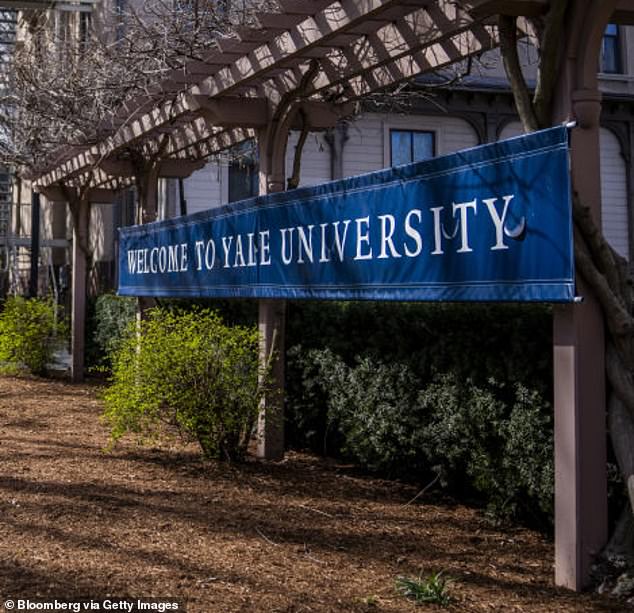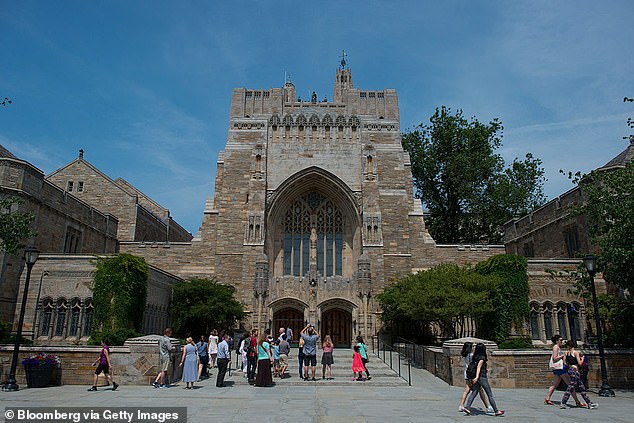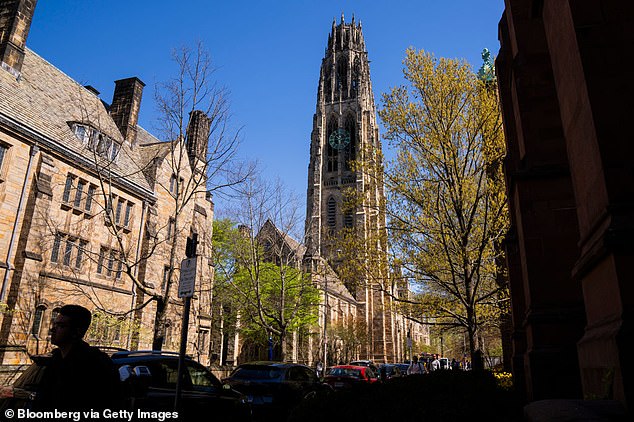Yale University has expelled an undergraduate student accused of fabricating her entire life story in one of the most elaborate admissions frauds uncovered at an Ivy League school.
The student, known on campus as ‘Katherina Lynn,’ was removed earlier this semester after administrators discovered that she had made up everything about her background: including her name, hometown, and family.
The student’s identity, transcripts, and personal history were all falsified, according to Air Mail, which first reported the details.
In reality, Lynn grew up in a Chinese-American family in Northern California‘s Bay Area and not in the small oil town of Tioga, North Dakota, where she claimed to be from.
She explained how she adopted a ‘Western’ identity during high school to escape bullying over her Chinese name and to gain a perceived edge in elite college admissions.
‘She knew that… when it comes to diversity, it’s not just about race,’ said Adam Nguyen, a former Columbia University admissions advisor to Fox News.
‘Diversity for colleges has a much broader definition. It also includes socioeconomic and geographic diversity. So she made herself into basically a white applicant with a very Caucasian-sounding name from a little town in North Dakota.
‘As with any institution, whether it’s elite universities like Columbia, Harvard, Yale or workplaces, any employer, you’ll see that if someone has the intent and the talent to do it, they can get through the screening process, whether it’s faking your transcript, faking employment record, faking even testimonials from former employers or teachers,’ Nguyen explained.

Yale University has expelled an undergraduate student accused of fabricating her entire life story in one of the most elaborate admissions frauds uncovered at an Ivy League school

The Sterling Memorial Library on the Yale University campus in New Haven, Connecticut
‘So you’re seeing that here, this particular individual went through great lengths and knew how to do all the right things. That said, the college admissions process is essentially trust but verify. Right now, they use different things like software, they do spot checking, but at the end of the day, it’s not 100% foolproof.’
According to Lynn’s own account, she spent years researching Ivy League application systems, studying admissions podcasts, and painstakingly forging her school records.
‘I had to learn how to use Adobe from scratch,’ she said in order to perfect and forge transcripts and financial documents. ‘I wrote my own letters of recommendation and came up with ways around [colleges’] security measures.
‘If I had not been as careful as I was, I would have gotten caught,’ she adds.
Lynn’s transformation began midway through high school.
She legally changed her name, skipped her real graduation, and claimed to have graduated from Tioga High School – a place that has never heard of her.
‘Unless she’s working on an oil rig, she’s not here,’ an innkeeper at the Tioga Microtel explained, the address Lynn listed on her application.
By late March 2024, her fabricated story paid off: she received an acceptance letter to Yale’s Class of 2029.

The student, known on campus as ‘Katherina Lynn,’ was removed earlier this semester after administrators discovered that she had made up everything about herself including her name
Lynn arrived on campus in August with a single suitcase and a carefully curated new identity.
Her dorm room door even displayed a name tag reading ‘Katherina Lynn – Tioga, North Dakota.’
But within weeks her plan began to unravel.
According to the Yale Daily News, suspicions arose when Lynn’s roommate, Sara Bashker, noticed inconsistencies in her story together with a luggage tag under another name and California address.
‘I took a photo and sent it to my [freshman counselor],’ Bashker said.
Later that night, she looked through Lynn’s purse and found the ID she had used to fly to Connecticut, which carried her real name and California address.
Bashker brought the evidence to Yale’s residential dean, prompting an immediate investigation.
Within days, Lynn was summoned to Dean Adam Ployd’s office and told that her admission had been rescinded.
She was escorted back to her dorm by Head of College Anjelica Gonzalez, a Yale police officer, and placed on a flight home to California the same day.

The town of Tioga, North Dakota, population 2,177 – where Katherina Lynn claimed to be from
‘Yale receives thousands of admissions applications each year, and the process relies on the honesty of the applicants and the accuracy of the information that is provided,’ said Yale spokesperson Paul McKinley in a statement.
‘When it came to the university’s attention that a student misrepresented themselves in their application, the university rescinded their admission as outlined in admissions policies.’
Now back home in California, Lynn said that she plans to ‘change my name and start over.’
‘I’m a little mad,’ she admitted. ‘Because I really liked that name.’
The incident serves to remind broader concerns about falsified applications, foreign interference, and inadequate vetting in academia.
The State Department has warned for years about attempts by foreign actors, particularly Chinese government-linked groups, to exploit US universities for access to research and influence operations.
While there is no evidence of government ties in Lynn’s case such elaborate deceptions could make institutions more vulnerable to security breaches or data theft.
‘If a random slacker can pull off this scam, terrorists and the Chinese government can, too,’ the Center for Immigration Studies, a Washington think tank that advocates for lower immigration levels.
